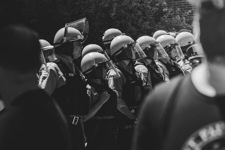Accountability Culture
May 1, 2021 In response to my November article about why we use the phrase “Black Lives Matter,” Clifford, a CLF member incarcerated in Illinois, asked me to look into the work of political philosopher Hannah Arendt, who wrote extensively about power and accountability from her vantage point as a survivor of the Holocaust in Germany.
In response to my November article about why we use the phrase “Black Lives Matter,” Clifford, a CLF member incarcerated in Illinois, asked me to look into the work of political philosopher Hannah Arendt, who wrote extensively about power and accountability from her vantage point as a survivor of the Holocaust in Germany.
Specifically, Clifford challenged my assertion that “I do not blame individual officers” for police violence against Black people. Drawing on Arendt’s work, Clifford wrote, “by not placing blame for particular action or inaction on the individual officers we not only strip them of the personal responsibility necessary to holding them… accountable, we undermine the importance and significance of the actions of those officers brave enough to stand up against the system.”
Hannah Arendt, in the essay Clifford asked me to read, “Personal Responsibility Under Dictatorship,” writes, “where all are guilty, none is.” Making the case that “it is better to suffer than to do wrong,” Arendt says that individuals have a moral obligation not to perpetuate systems of injustice, even when their own lives or livelihoods are at stake. Clifford, and Hannah Arendt, of course, are correct. It is vital—even in an unjust system—that the individual perpetrators of acts of injustice be held accountable for their actions.
Arendt also notes that politically, “those who chose the lesser evil forget very quickly that they chose evil.” “Acceptance of lesser evils,” she continues, “is consciously used in conditioning the…population at large to the acceptance of evil as such.” This is precisely how systems as violent and unjust as modern policing in the United States have become institutions that most white Americans support and trust—those of us acculturated to whiteness have been conditioned to accept evil.
Clifford is also right when he asserts that the notions of responsibility and accountability are not limited to extreme cases. Each of us makes moral judgments every day. Each of us makes choices for good or bad every day. Each of us has the option, again and again, to choose to participate in perpetuating wrong or to oppose it. And each of us should be held accountable when our actions cause harm to others.
It is here that we find tensions inherent in the principles that Unitarian Universalist congregations covenant to affirm and promote. One example is the tension between freedom and responsibility. Our fourth principle says we affirm “a free and responsible search for truth and meaning.” Freedom has limits. Elsewhere, the “right of conscience” promised in the fifth principle is not always compatible with the “justice for all” we seek in our sixth. Conscience has limits, too.
As a covenantal faith, we rely on how we agree to be together to help us decide what to do. And we rely on processes that help bring us back to covenant when we cause harm—processes of accountability in which we are asked to stop the harm that we are doing, to understand the harm we have done, to make amends for the harm, and finally, to agree not to do it again. Within our faith, just as in our society at large, these processes are imperfect. And yet, they are how we move forward towards creating better systems.
- Winter Magic - December 12, 2024
- Post-Election Message - November 20, 2024
- On Covenant and Accountability - September 11, 2024
Quest Monthly Print Edition
Recent Issues
Latest Spiritual Reflection Posts
Weekly Newsletter
About
Quest for Meaning is a program of the Church of the Larger Fellowship (CLF).
As a Unitarian Universalist congregation with no geographical boundary, the CLF creates global spiritual community, rooted in profound love, which cultivates wonder, imagination, and the courage to act.
Contact
Church of the Larger Fellowship Unitarian Universalist (CLFUU)
24 Farnsworth Street
Boston MA 02210
